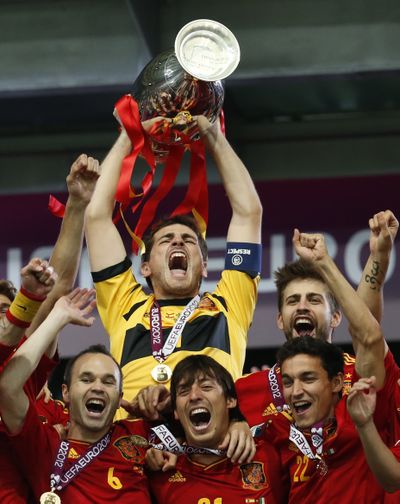Commentary: Spain’s soccer reign has historic implications

KIEV, Ukraine – Even in slow-motion replays, Spain still seemed to play at 1 million miles an hour. The Italians? Well, they looked as though they’d been locked inside a pinball machine, which, in a way, they had.
Is it heresy to liken the first team to defend the European Championship to other geniuses – Pablo Picasso, Antoni Gaudi and so on – that Spain has shared with us over the centuries?
If you’re a fan of soccer as art, then surely not. And to think there were those who accused Spain of being “boring” at Euro 2012, of playing selfish and tiresome keep-ball instead of devastatingly effective soccer.
Eat your words. Because, as it turned out, Spain was saving its grand finale for a warm night in Kiev that ensured Ukraine and Poland got a send-off fitting for the fabulous tournament they co-hosted – the first Euros to venture this far east.
Fizz! A through ball from Xavi Hernandez, delivered with the clockwork timing of a Swiss watch. Bang! Jordi Alba, moving in at top speed, took Xavi’s gift of the pass and turned it into a goal. Simple. 2-0.
And this wasn’t even over and out. There were still 49 minutes of this lopsided final to play. Spain wasn’t done, not even close.
Even the erratic Fernando Torres found the net – a measure of how thoroughly Spain dismantled the Italians, whose unlikely trip to the final few would have banked on but which, given the flair and creativity they oozed to get this far, they fully deserved.
Italy arrived at Euro 2012 under the cloud of a match-fixing scandal at home. It can leave Ukraine with its head held high.
Coach Cesare Prandelli achieved his goal of demonstrating that Italians can move beyond the defensive style they were long famed for. Only, in the final, Spain never gave them enough time on the ball to reproduce the quick and effective attacks they mounted in previous matches.
And Spain’s goalkeeper, Iker Casillas, proved unbeatable. He let in just one goal all tournament, in Spain’s first game – a 1-1 draw with, as it happened, Italy. In the rematch, he wasn’t going to let that happen again.
To be fair, Italy played the last half-hour of the final down a man. Thiago Motta was carried off injured when Prandelli had already used his three substitutions. But would it really have made any difference? Not against this Spanish armada.
When Juan Mata made it 4-0, Italy striker Mario Balotelli sank to his haunches. His two semifinal goals got Italy to this game. Mostly starved of the ball by Spain, he couldn’t get Italy’s hands on the Henri Delaunay cup.
Aficionados will debate how Spain, the 2012 vintage, matches up against other great teams that seared their way into soccer history.
Did it have the sustained brilliance of Pele’s Brazil that scored 19 times in six games to win the 1970 World Cup? Was it even as good as the Spain side that won the Euros four years ago? But Spain’s unprecedented achievements speak for themselves – Euro 2008, the 2010 World Cup and Euro 2012 in succession, a first.
And Casillas, Sergio Ramos, Andres Iniesta, Xavi, Cesc Fabregas, David Silva, Torres and Xabi Alonso now also form their own exclusive club of players who played in two winning Euro finals.
“We are very happy for all the country and for us. I think we deserved it, we were superior to Italy. We played a complete game and perhaps the best of the entire Eurocup,” Xavi said. “We made history and now we have to enjoy it with all those who supported us and our families.”